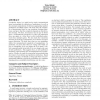Free Online Productivity Tools
i2Speak
i2Symbol
i2OCR
iTex2Img
iWeb2Print
iWeb2Shot
i2Type
iPdf2Split
iPdf2Merge
i2Bopomofo
i2Arabic
i2Style
i2Image
i2PDF
iLatex2Rtf
Sci2ools
112
click to vote
ATAL
2008
Springer
2008
Springer
Complexity of terminating preference elicitation
Complexity theory is a useful tool to study computational issues surrounding the elicitation of preferences, as well as the strategic manipulation of elections aggregating together preferences of multiple agents. We study here the complexity of determining when we can terminate eliciting preferences, and prove that the complexity depends on the elicitation strategy. We show, for instance, that it may be better from a computational perspective to elicit all preferences from one agent at a time than to elicit individual preferences from multiple agents. We also study the connection between the strategic manipulation of an election and preference elicitation. We show that what we can manipulate affects the computational complexity of manipulation. In particular, we prove that there are voting rules which are easy to manipulate if we can change all of an agent's vote, but computationally intractable if we can change only some of their preferences. This suggests that, as with preferen...
Related Content
| Added | 12 Oct 2010 |
| Updated | 12 Oct 2010 |
| Type | Conference |
| Year | 2008 |
| Where | ATAL |
| Authors | Toby Walsh |
Comments (0)

